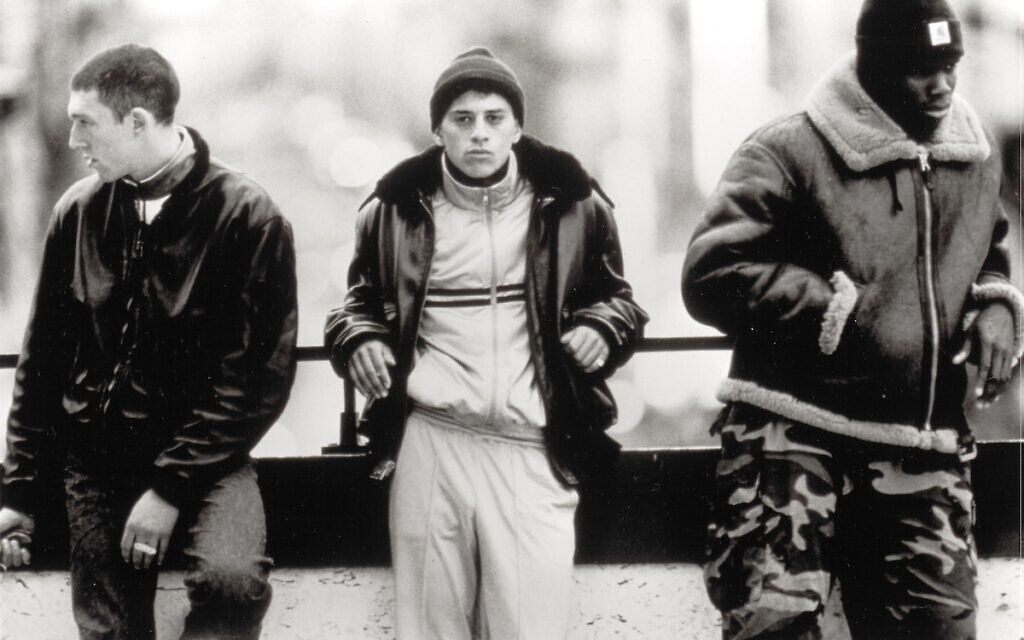Mathieu Kassovitz: ‘I made La Haine to warn others about what was happening’
Top writer and director talks to Brigit Grant about his genre-changing classic, which opened French eyes
He never agreed to be the spokesperson for his country’s immigrant underclass, but 25 years after making La Haine, writer and director Mathieu Kassovitz, is still asked to comment.
The Hate, as it is less lyrically known in English, is the story of three young men – one an Ashkenazi Jew, one black and one north African – living in a deprived, drug-infested housing project outside Paris.
Artily shot in black and white, La Haine showed what immigrant life was like beyond the chic arrondissements – and it became a cult classic.
Get The Jewish News Daily Edition by email and never miss our top stories Free Sign Up
Cited in academic studies on social unrest, Kassovitz controversially showed the reality of police brutality in the ‘banlieues’ (projects) to a blinkered elite, and caused furore at the Cannes film festival, where he won best director and the police turned their backs in protest.
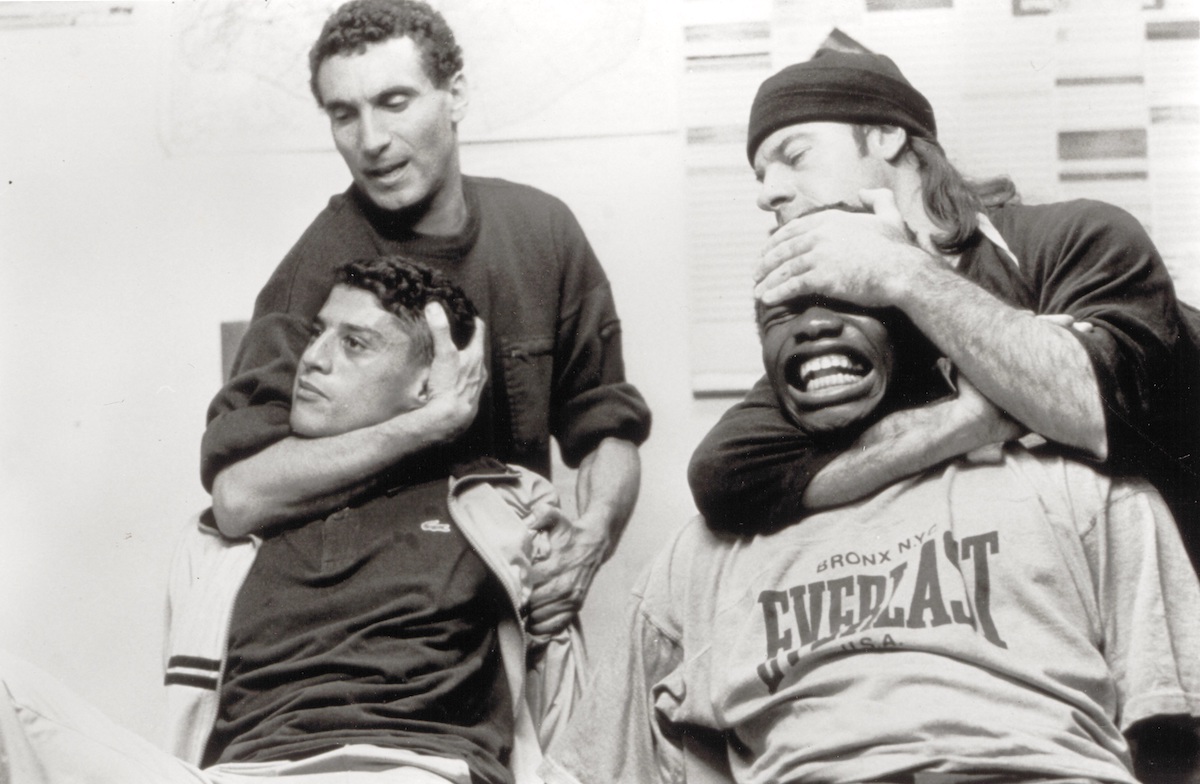
Even Jean-Marie Le Pen, then leader of the Front National, was riled and called for the ‘yobs to be jailed’ – which is a real achievement for a Jewish film director and grandson of Hungarian concentration-camp survivors. Kassovitz made La Haine in part to help his father understand why “ a little Jewish guy” was hanging out in the projects with black guys, so what does he make of the antisemitism in France now?
“There’s no real antisemitism in France,” he says without hesitating and I’m thrown.
Back in February, Paris-based political commentator Anne-Elisabeth Moutet described France as “the most antisemitic country in the west”, and the pandemic has started a wave of anti-Jewish rhetoric in caricatures and YouTube videos attributing blame on us. Yet Kassovitz who was“raised in a world of Jewish humour” is not convinced there’s an issue.
“I have never experienced something like that, or had a friend who was insulted that way,” he insists. “I believe there is a very strong feeling about Israel’s policies and that is what they’re fighting against. Yes, there is a blatantly racist hard core, but there are others who are not educated and struggle to see a difference between an Orthodox Jew in the street and what they see of Israel on TV with machine guns and shooting.
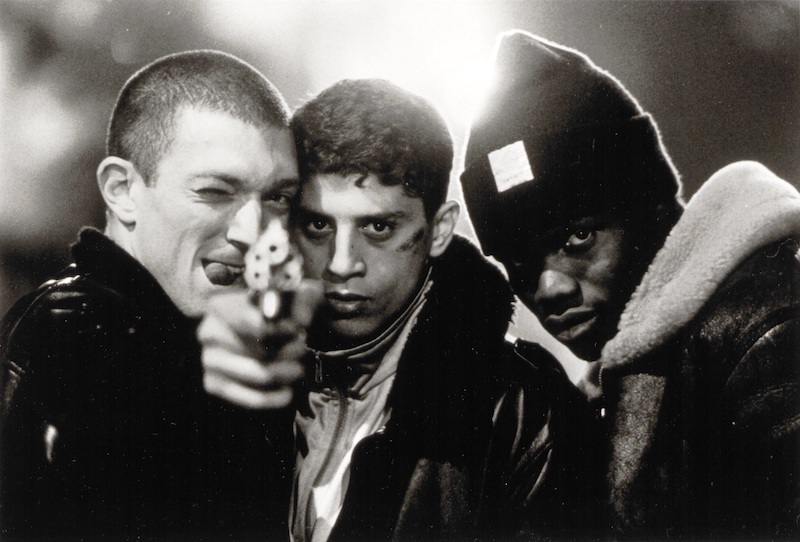
“So of course it creates a very strong, violent feeling, but it’s not antisemitism as we would define it. Not like the Nazis. Not like people who do really hate Jews. It’s just kids being stupid and not knowing. They are confronting Israeli policy.”
He continues: “Jews in France say there is antisemitism because some are victims of it and when you are a victim, you think it’s part of the perpetrator’s culture. It isn’t and I never felt it. I hang out with black guys and Arabs and never had any problems. Never.”
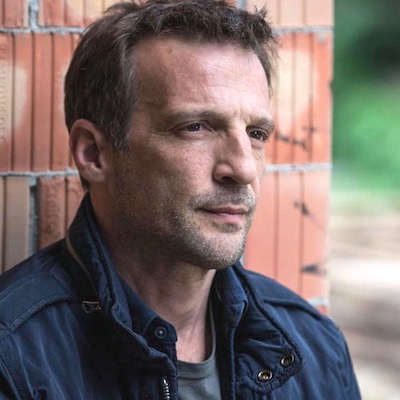
Kassovitz’ friendships and experiences in the housing project of Chanteloup, where he later filmed La Haine, naturally inform his strident views – which many would challenge – but further questions are left hanging as he has to feed his children in 20 minutes.
Kassovitz adjusted to lockdown better than others in entertainment and he loves being confined. “I just enjoy being by myself with nobody f****** around with me and wish I could be like that all the time. I have a nice house and I’m with my kids and dogs, so I don’t need anybody else. All I need is a government cheque so I don’t have to go to work.”
For fans of the glorious French film Amélie, Kassovitz will always be Nino, the handsome elusive stranger pursued by Audrey Tautou’s kooky waitress, and he has new fans hooked on his current role as the intelligence officer code-named Malotru in the French spy series The Bureau on Amazon.
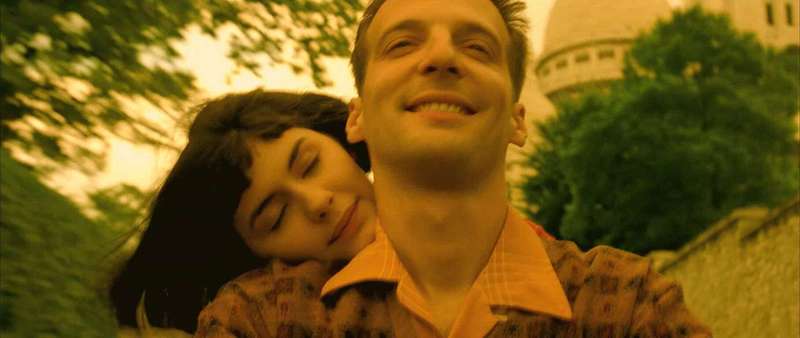
The BFI rerelease of La Haine on its silver anniversary reminds us of the impact Kassovitz made when he wrote a game-changing script inspired by the murder of a 17-year-old Zairian immigrant in police custody. There were hundreds more similar cases, which begs the question: is life better now in the ‘banlieues’?
“I think it is better,” he replies. “Because it’s the same as before, but the police brutality is much more documented.
“People are more aware and there are activist movements, which didn’t exist 25 years ago. The names of the victims are known today and people are fighting for them. And that’s the difference.
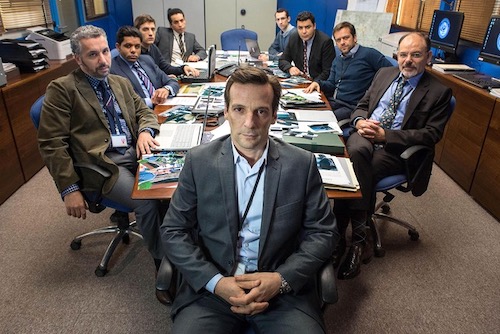
“I made the movie to warn others about what was happening and the kids who were victims of it. And now 25 years later, we can see it’s true.”
I made the movie to warn others about what was happening and the kids who were victims of it. And now 25 years later, we can see it’s true.
In 2015, there was talk of Kassovitz doing a sequel to La Haine, but as he no longer considers film-making as impactful as a one-minute Instagram video, he is doing a contemporary stage musical sequel instead.
With rap? Like Hamilton? I propose. “It will make more sense than Hamilton as they will rap for the right reasons,” he jokes pointedly and then proceeds to loosely describe his urban opera, which begins rehearsing this month. “It will open in Paris and at some point come to London,” he says.
And it’s all in French? “Yes, in French,” he informs me.
That’s me told and I wished him bon appetit.
• La Haine opens tomorrow at the BFI Southbank and is released on remastered Blu-Ray from 16 November

Thank you for helping to make Jewish News the leading source of news and opinion for the UK Jewish community. Today we're asking for your invaluable help to continue putting our community first in everything we do.
For as little as £5 a month you can help sustain the vital work we do in celebrating and standing up for Jewish life in Britain.
Jewish News holds our community together and keeps us connected. Like a synagogue, it’s where people turn to feel part of something bigger. It also proudly shows the rest of Britain the vibrancy and rich culture of modern Jewish life.
You can make a quick and easy one-off or monthly contribution of £5, £10, £20 or any other sum you’re comfortable with.
100% of your donation will help us continue celebrating our community, in all its dynamic diversity...
Engaging
Being a community platform means so much more than producing a newspaper and website. One of our proudest roles is media partnering with our invaluable charities to amplify the outstanding work they do to help us all.
Celebrating
There’s no shortage of oys in the world but Jewish News takes every opportunity to celebrate the joys too, through projects like Night of Heroes, 40 Under 40 and other compelling countdowns that make the community kvell with pride.
Pioneering
In the first collaboration between media outlets from different faiths, Jewish News worked with British Muslim TV and Church Times to produce a list of young activists leading the way on interfaith understanding.
Campaigning
Royal Mail issued a stamp honouring Holocaust hero Sir Nicholas Winton after a Jewish News campaign attracted more than 100,000 backers. Jewish Newsalso produces special editions of the paper highlighting pressing issues including mental health and Holocaust remembrance.
Easy access
In an age when news is readily accessible, Jewish News provides high-quality content free online and offline, removing any financial barriers to connecting people.
Voice of our community to wider society
The Jewish News team regularly appears on TV, radio and on the pages of the national press to comment on stories about the Jewish community. Easy access to the paper on the streets of London also means Jewish News provides an invaluable window into the community for the country at large.
We hope you agree all this is worth preserving.
-
By Brigit Grant
-
By Laurent Vaughan - Senior Associate (Bishop & Sewell Solicitors)
-
By Laurent Vaughan - Senior Associate (Bishop & Sewell Solicitors)
-
By Laurent Vaughan - Senior Associate (Bishop & Sewell Solicitors)
-
By Laurent Vaughan - Senior Associate (Bishop & Sewell Solicitors)


